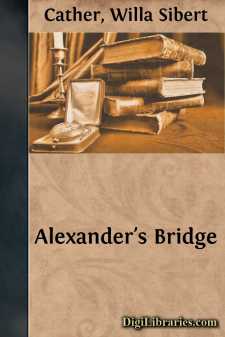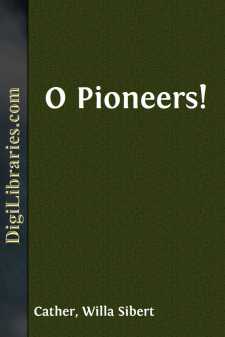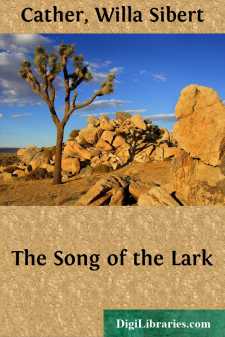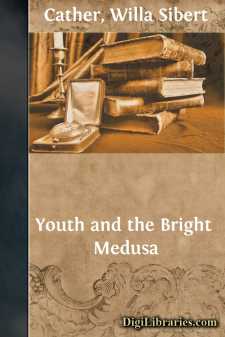Categories
- Antiques & Collectibles 13
- Architecture 36
- Art 48
- Bibles 22
- Biography & Autobiography 813
- Body, Mind & Spirit 142
- Business & Economics 28
- Children's Books 17
- Children's Fiction 14
- Computers 4
- Cooking 94
- Crafts & Hobbies 4
- Drama 346
- Education 46
- Family & Relationships 57
- Fiction 11829
- Games 19
- Gardening 17
- Health & Fitness 34
- History 1377
- House & Home 1
- Humor 147
- Juvenile Fiction 1873
- Juvenile Nonfiction 202
- Language Arts & Disciplines 88
- Law 16
- Literary Collections 686
- Literary Criticism 179
- Mathematics 13
- Medical 41
- Music 40
- Nature 179
- Non-Classifiable 1768
- Performing Arts 7
- Periodicals 1453
- Philosophy 64
- Photography 2
- Poetry 896
- Political Science 203
- Psychology 42
- Reference 154
- Religion 513
- Science 126
- Self-Help 84
- Social Science 81
- Sports & Recreation 34
- Study Aids 3
- Technology & Engineering 59
- Transportation 23
- Travel 463
- True Crime 29
Willa Sibert Cather
Willa Sibert Cather was a renowned American author, known for her novels depicting frontier life on the Great Plains. Her most famous works include "My Ántonia," "O Pioneers!," and "Death Comes for the Archbishop," which explore themes of pioneering, immigration, and the hardships of rural life. Cather's evocative writing and deep character studies have earned her a lasting place in American literature.
Author's Books:
Sort by:
Peter “No, Antone, I have told thee many times, no, thou shalt not sell it until I am gone.” “But I need money; what good is that old fiddle to thee? The very crows laugh at thee when thou art trying to play. Thy hand trembles so thou canst scarce hold the bow. Thou shalt go with me to the Blue to cut wood to-morrow. See to it thou art up early.” “What, on the Sabbath, Antone, when it is so...
more...
CHAPTER I Late one brilliant April afternoon Professor Lucius Wilson stood at the head of Chestnut Street, looking about him with the pleased air of a man of taste who does not very often get to Boston. He had lived there as a student, but for twenty years and more, since he had been Professor of Philosophy in a Western university, he had seldom come East except to take a steamer for some foreign port....
more...
INTRODUCTION LAST summer I happened to be crossing the plains of Iowa in a season of intense heat, and it was my good fortune to have for a traveling companion James Quayle Burden—Jim Burden, as we still call him in the West. He and I are old friends—we grew up together in the same Nebraska town—and we had much to say to each other. While the train flashed through never-ending miles of ripe...
more...
One January day, thirty years ago, the little town of Hanover, anchored on a windy Nebraska tableland, was trying not to be blown away. A mist of fine snowflakes was curling and eddying about the cluster of low drab buildings huddled on the gray prairie, under a gray sky. The dwelling-houses were set about haphazard on the tough prairie sod; some of them looked as if they had been moved in overnight,...
more...
Claude Wheeler opened his eyes before the sun was up and vigorously shook his younger brother, who lay in the other half of the same bed. "Ralph, Ralph, get awake! Come down and help me wash the car." "What for?" "Why, aren't we going to the circus today?" "Car's all right. Let me alone." The boy turned over and pulled the sheet up to his face, to shut out the...
more...
I Dr. Howard Archie had just come up from a game of pool with the Jewish clothier and two traveling men who happened to be staying overnight in Moonstone. His offices were in the Duke Block, over the drug store. Larry, the doctor's man, had lit the overhead light in the waiting-room and the double student's lamp on the desk in the study. The isinglass sides of the hard-coal burner were aglow,...
more...
On the Divide Near Rattlesnake Creek, on the side of a little draw stood Canute's shanty. North, east, south, stretched the level Nebraska plain of long rust-red grass that undulated constantly in the wind. To the west the ground was broken and rough, and a narrow strip of timber wound along the turbid, muddy little stream that had scarcely ambition enough to crawl over its black bottom. If it had...
more...
I Don Hedger had lived for four years on the top floor of an old house on the south side of Washington Square, and nobody had ever disturbed him. He occupied one big room with no outside exposure except on the north, where he had built in a many-paned studio window that looked upon a court and upon the roofs and walls of other buildings. His room was very cheerless, since he never got a ray of direct...
more...









